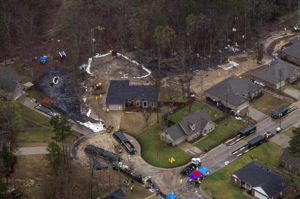Attorney General Dustin McDaniel called on Exxon Mobil Corp. on Tuesday to buy all the houses in the Mayflower subdivision where a crude-oil pipeline ruptured more than a month ago, as well as property near an oil-contaminated cove of Lake Conway.

“I believe that Exxon should offer to purchase all the affected properties” in the Northwoods subdivision, as well as those near the cove, at a pre-spill appraisal price, McDaniel said.
McDaniel, speaking at a Little Rock news conference, said the corporation’s 38-page compensation plan offered to subdivision residents is not adequate and is too complex.
He also is concerned, he said, about the public-health implications of the Pegasus pipeline rupture, which Exxon Mobil has estimated dumped 5,000 barrels, or 210,000 gallons, of heavy crude oil into the neighborhood, drainage ditches and finally the cove. Authorities have said that a series of man made barriers prevented the oil from reaching the main body of the lake.
Many residents, McDaniel said, “continue to suffer from headaches and nausea.”
“I have a real concern about the short- and long-term effects of carcinogens released into the air which are still detectable in the living rooms of people in that area,” he said. He specifically said that the carcinogen benzene had been detected in some homes.
Told of McDaniel’s comment on the benzene findings, Exxon Mobil spokesman Aaron Stryk said in an e-mail: “Ongoing air monitoring in the Mayflower community has shown levels that are either [nondetectable] or below action levels established by the Arkansas Department of Health.”
Asked about such state-released air-quality data, McDaniel said the presence of the chemical is still a concern even if levels fall below those considered an “imminent health risk.”
“Who determines what’s an imminent health risk?” he said. “And if it was your house, how much would you be content to have benzene in the living room and be comforted that it’s not an imminent health risk?”
Exxon Mobil has said previously that it has offered to buy 11 of the roughly 60 houses in the middle-class subdivision.
Asked whether the company would consider complying with McDaniel’s suggestion that it buy all of the affected properties, Stryk on Tuesday released a two-page fact sheet that summarized the lengthy compensation plan. That sheet said the company would buy the houses that were evacuated at a price the homeowners would have received had the spill not occurred.
Twenty-two houses remained evacuated Tuesday, although residents in up to 10 of them have been told for some time that they can move back if they wish. It was unclear how many houses Exxon Mobil considers to have been evacuated since, even more houses were evacuated immediately after the March 29 spill.
For nonevacuated residents in the subdivision, the fact sheet indicated, the company would offer a more restricted buyout plan. Those residents would need to put their homes up for sale first and meet other conditions.
Pressed for details, including whether Exxon Mobil would consider buying homes near the oil-contaminated cove, Stryk replied: “The program is focused on Northwoods because the incident happened in that subdivision. For residents outside of the subdivision, Exxon Mobil will continue to honor all valid claims.”
McDaniel said that in addition to some residents’ unhappiness with the compensation plan, “Others haven’t been spoken to at all” by Exxon Mobil. The compensation plan, to his knowledge, does not cover those people living near the cove, he said.
Exxon Mobil officials, citing their wish to honor residents’ privacy, have repeatedly declined to say how many, if any, homeowners have taken the company up on its offer to buy their houses. Once houses are sold, however, such information becomes public record in Arkansas.
Jacksonville attorney John Ogles - who represents Greg and Ashala Doster, whose house sits immediately beside the rupture site - said Tuesday that he thinks “everybody’s selling” who can.
“I haven’t heard of anybody that’s going to move back in,” Ogles said.
The Dosters, who have three children, are among those planning to sell their homes to Exxon Mobil.
“We’re in the process,” Ogles said.
“Our clients’ house smells like a dang auto garage where the engine’s been running six months with the windows closed,” Ogles said. “They’re probably going to have to tear it down. … You can’t live in it.”
The Dosters have been living with Greg’s parents and haven’t spent a single night in their own home since the spill, Ogles said.
As of Tuesday, Exxon Mobil spokesman Michael Kontos said, the number of workers in the spill area, which stretches about one mile from the subdivision to the cove, was down to about 400, substantially below earlier numbers.
Storm-drain replacement is nearing completion in the subdivision, Kontos said in an e-mail.
“Once that is finished, street repairs will take place, which will be followed by landscaping,” he added.
Workers are “conducting ongoing maintenance and monitoring” of the cove, Kontos said, “and will be working over the next few days to lower the water back to its regular level.”
McDaniel observed: “The magnitude of the response effort reflects the magnitude of the incident itself.”
“The smell is a constant reminder that things are not as they should be,” the attorney general said.
In prepared remarks, he said the cove and the subdivision resemble construction sites with “heavy equipment everywhere, much of it contaminated with oil as it goes down roads and through yards. … Mayflower is a long way from being made whole again.”
Although McDaniel’s office has not sued the corporation, he said: “We’re certainly preparing for litigation.”
Staff members in his office have “already devoted more than 1,000 hours,” made more than two dozen visits to the site, conducted dozens of interviews and taken hundreds of photographs as part of the investigation, McDaniel said. The office also is having air, water and soil sampling done, including air quality within seven homes near the cove, he said.
McDaniel also has set up a task force within his office to address residents’ concerns, has devoted a page of the attorney general’s website to the crisis with information on how residents can contact his office, and has requested that anyone with pictures or video from the day of the spill, Good Friday, share them with his staff.
Exxon Mobil said again Tuesday that the cause of the rupture of the pipeline, which runs from Illinois to the Gulf Coast of Texas and which was built in 1947 and 1948, remains under investigation. Until federal approval is granted, the company cannot restart the pipeline.
Kontos said residents of the 22 evacuated homes haven’t returned “due to the heavy work in the area.”
But McDaniel said that while construction is one concern, residents have told his office that they also worry about taking their children back into the area for health reasons.
Despite repeated questions, Exxon Mobil would not directly answer the question of whether residents in the 12 homes not previously cleared for re-entry now have been. Instead, Kontos said, “We are in the process of discussing the updated re-entry procedure for all evacuated residents.” Asked again, he said: “What I can say at this point is that we will be discussing a revised re-entry procedure with evacuated residents this week.”
Wildlife near the popular fishing lake continues to be affected by the oil.
As of Monday, Kontos, said 489 creatures have been captured and taken to a rehabilitation center. Of those, 394 have been released, he said; 123 creatures were found dead, he said, and 238 snakes have been euthanized in the field. Nine other creatures have been euthanized at the center, he said.
Front Section, Pages 1 on 05/08/2013
